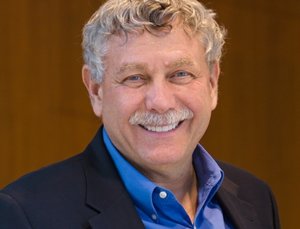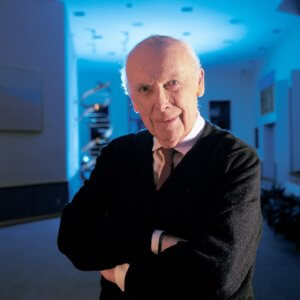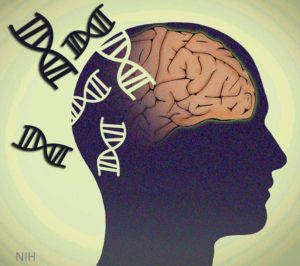The move effectively removes the final honorary positions held by Dr. Watson at the lab he once helmed.
According to the statement by Cold Spring:
Dr. Watson’s statements are reprehensible, unsupported by science, and in no way represent the views of CSHL, its trustees, faculty, staff, or students. The Laboratory condemns the misuse of science to justify prejudice.
His remarks “effectively reverse the written apology and retraction Dr. Watson made in 2007,” wrote Marilyn Simons, chair of the board of trustees of the lab and Bruce Stillman, president and CEO, in the announcement that revoked his honorary titles of Chancellor Emeritus, Oliver R. Grace Professor Emeritus, and Honorary Trustee. Dr. Watson was director and president of the lab for many years.
In May 2018, we examined the controversy surrounding the comments made by the Nobel prize winner. Apparently not much has changed.
“As Twitter explodes, Eric Lander apologizes for toasting James Watson,” raged the headline from STAT on May 14, 2018, as the gaff echoed.
Eric Lander, founding director of the Broad Institute of MIT and Harvard honored the co-discoverer of the structure of DNA on his 90th birthday, at a dinner May 12 at the Biology of Genomes meeting at the Cold Spring Harbor Laboratory on Long Island. Dr. Watson served as director of the lab since 1968, and was asked to leave in 2007 after he told The Sunday Times magazine that he is “inherently gloomy about the prospect of Africa” because “all our social policies are based on the fact that their intelligence is the same as ours–whereas all the testing says not really.”

Dr. Watson’s 2007 outrageous uttering didn’t surprise me. I’d attempted to converse with him one-on-one a few years earlier, and a few years later, he’d single me out of a crowd at a genetics conference.
Bizarre 2004 interview
In 2004, I made the 14-hour roundtrip trek by train in one day to meet and interview Dr. Watson on his turf, at Cold Spring Harbor. Francis Crick had recently died, and I wanted to interview Dr. Watson while he was still around. I was writing regularly for The Scientist then, where I planned to publish my Q+A.
He was prompt, polite, and charming. And then I asked my first question.
“Dr. Watson, which do you think was more significant, deducing the structure of DNA, or sequencing the human genome?”
He sat back, smiled, and stroked his chin, seemingly deep in thought. It wasn’t a bad question to start. A pause, then …
“Ricki, do you consider yourself a girl or a woman?”
I ignored that and asked the question a more open-ended way, but after several tries, it became clear that he was amusing himself and would not speak seriously with me. I didn’t get a single quote, although he was extremely helpful in calling me a cab back to the train station and holding open doors. It was a wasted, and utterly disappointing, day. The experience was completely the opposite of meeting Craig Venter, who engaged with me intellectually immediately.

Genetic losers
I heard Dr. Watson again at the opening session of the 12th International Congress of Human Genetics in Montreal in October, 2011. He was on a panel of “genome pioneers” who were among the first individuals to have their genomes sequenced. Kevin Davies moderated. Dr. Davies has quite the publishing pedigree, author of “The $1,000 Genome and other books, was then publisher of Chemical & Engineering News, was the founding editor of Nature Genetics, and is now executive editor of The CRISPR Journal.
Dr. Watson, who was the second person to have his genome sequenced following Craig Venter, spoke first. Some of his comments were insightful and funny, others too offensive to publish, back then. But in light of Eric Lander’s backpedaling on the praise (and giving it in the first place), and against the backdrop of a long-overdue intolerance for misogyny, here they are.
Kevin Davies: Why did you have your genome sequenced?
James Watson: I thought, why not? I had no objection, with the exception of not wanting to know ApoE4. My grandmother had Alzheimer’s in her 90s, and the fact that I was in my 70s and didn’t have it didn’t reassure me I wouldn’t in my 90s.
(ApoE4 and the surrounding DNA were deleted from Watson’s published genome sequence. He didn’t want to know, although it was possible to impute it from the surrounding DNA sequence. Having two copies of a variant of this gene increases Alzheimer’s risk 15-fold and having one copy raises it 3-fold.)

Davies: What did you learn that was useful?
Watson: Finding that I am a slow metabolizer of antipsychotics and beta blockers. I have a slightly irregular heartbeat and the doctor put me on beta blockers. Two put me to sleep. Now I take them once a week, so knowing I’m a slow metabolizer was a real medical benefit. It also may have explained a mystery concerning my son. He almost died of neuroleptic malignant syndrome from an antipsychotic. I now know that if I go psychotic, I will tell people I can’t take those drugs.
Davies: Was any genome information not helpful?
Watson: “They told me I had something that should have killed me, a mutation in a DNA repair gene. And so I decided not to think about it. I didn’t go and look it up. Then they told me I was one base pair off the bad one. They told me I was a carrier for BRCA1 and so I thought I would have to phone my nieces because their mother had breast cancer. But before that I asked Mary-Claire King (who discovered the gene) and she said no, I had a harmless variant. So I’m glad I didn’t call my nieces because then they would have paid that disgraceful sum of money to Myriad Genetics. (Which then had a stranglehold on testing.)
Davies: Who should have their genomes sequenced?

Watson: I’d like to see children who have mental illness sequenced with their parents. My son has schizophrenia. The moment you have a son who is not normal, you wonder if you are the cause, or if you could have done something differently. Finding a mutation would make parents see that it was just genetic injustice, not anything they did. Knowing that won’t make their child healthy, but they won’t have the double whammy of thinking they did something wrong. I think an educated society doesn’t like genetics because it is so deterministic, and they would prefer it if you could have diets so you wouldn’t have a mentally ill child.
It is my belief that about 5% of children are born with rather bleak long-term futures. They really won’t be able to take care of themselves. They might become homeless later in life and I think making people aware of this goes back to Hermann Muller, who worried about mutational load. We should think this way again.
Evolution means mutations and there are going to be losers who, 20,000 years ago, would not have lived very long. But now in our so-called compassionate society we should take care of them, but we do so very badly as they age.
There are some born losers. It’s not that their parents were bad. But what’s the ethical responsibility to take care of the genetic losers? Having set up the ELSI (The Ethical, Legal and Social Implications) research program, I suspect that all the programs put together have yielded nothing of value. They’re talking about minor things. The major issue is, what do we do with people with mad genes? That’s never discussed.
Davies: Has your son influenced you to have your genome sequenced?
Watson: My son would say yes, but he didn’t want to. He doesn’t want to discuss it. I would have a completely different view, that we might be able to help him and he should have no choice, but that is the sort of thing brought up at ELSI meetings. I find them counterproductive to help the people born with genetic disease.
I’m very conscious of genetic losers – other people want to deny their existence. Other people want to cure them.”
Davies: Are you worried about the flood of data from sequencing genomes?
Watson: I’m more worried that we’ll get the flood of information and we won’t use it because of excessive concern about privacy. Right now I’d be pragmatic, be as free as possible with sequencing genomes, and then if disaster is the result, we’ll try to correct it. I’d hate for anyone to say ‘you can’t tell your child that he has a DNA change.’ I think parents, within limits, should have control over what their children know, and trying to regulate that would be just awful.
I’m very happy the $1000 genome exists. Genetics will help us to understand why people don’t fit in. Every time someone goes into a children’s hospital with a serious disease, it would be immoral NOT to sequence him.
Postscript: At the end of the panel discussion, I was the first to leap onstage to approach Dr. Watson to ask questions. I was very dressed up (rare for me) and the only XX in the immediate vicinity. Hoards of young, XY groupies glared up at me from the audience as Dr. Watson turned on the charm and talked to me for nearly 5 minutes.
Maybe I was no longer just a girl.
Ricki Lewis is the GLP’s senior contributing writer focusing on gene therapy and gene editing. She has a PhD in genetics and is a genetic counselor, science writer and author of The Forever Fix: Gene Therapy and the Boy Who Saved It, the only popular book about gene therapy. BIO. Follow her at her website or Twitter @rickilewis.































